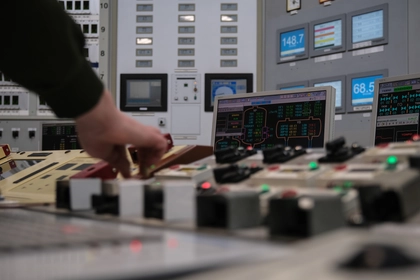Everyday Ukrainians are frustrated by the ban on their country’s use of long-range US weapons against targets deeper in Russia, and not optimistic about policy change, according to a street survey by Kyiv Post in Lviv on Sunday morning.
British Prime Minister Keir Starmer met US President Joe Biden at the White House on Friday as Ukraine’s allies continue to discuss whether to give a go-ahead to Kyiv, but no announcement following the meeting.
JOIN US ON TELEGRAM
Follow our coverage of the war on the @Kyivpost_official.
Yaroslav and Olena from Zhytomyr were taking a stroll with their young son down Lviv’s Prospekt Svobody where a fun run to benefit the Armed Forces of Ukraine was wrapping up.
“When you look at how our citizens are suffering from Russian missiles, I wouldn’t hesitate for a second to use missiles back at the aggressor,” Olena, 38, said. “We have every right to do so.”
“Unfortunately, we rely on our allies. While we’re grateful to them for their assistance, it’s hard to understand their policy about the missiles,” she continued. “Perhaps, it’s their leaders’ fear of their own citizens’ reaction. To be honest, that’s a luxury we don’t have,” she said.
Vladimir Putin said last week that the West would be directly fighting Russia if it allowed Ukraine to strike with Western-made long-range missiles.
When asked about the Russian dictator’s “red line” pronouncement, Yaroslav, 42, was disdainful.

IMF Approves $1.1 Billion Loan Disbursement to Ukraine Before Trump Inauguration
“If the ‘red lines’ were real, World War III would have started after Kursk. Or, after the destruction of the Black Sea fleet, or any other change in the war. It’s all his bluff,” he said.
Mykhailo and Lesia were off to a family gathering when they contributed their thoughts.
“I am no analyst, but I know that we need the policy to change,” Mykhailo, aged 70, said. “The Americans seem afraid of the precedent that might create ‘escalation,’ but that’s a flawed idea. History teaches us escalation occurs because of weakness not strength,” he said.

When asked if US policy is likely to change, Lesia, aged 66, said it was hard to know because there will soon be a new administration in the White House.
“That’s terra incognita,” she said about what may occur after the November Presidential election.
Russian-speaking Inna, 49, who moved to Lviv from eastern Ukraine at the outset of the full-scale war, was angered by US policy.
“The policy is a joke. It has to end and, with it, the Kremlin has to end. Then, our people stop dying,” she said.
Ihor, 76, was walking home from church services when he stopped to speak with Kyiv Post’s reporter.
“It’s a ridiculous policy. We need the permission because, without the permission, we will not win the war. The Europeans are asleep so we need the Americans and the British,” the older gentleman said.
“I don’t know why the Americans are waiting. Perhaps, they stupidly listen to Putin’s threats about nuclear war,” he continued.
Ihor strongly took the view that Ukraine, too, needs to take responsibility for its current situation.
“The truth is we should have been prepared. First, we made the huge mistake of the Budapest Memorandum and, then, we did so little to prepare our own defenses,” he said. “Now, we have the drones, and that’s good, but we needed long ago to switch our production to a military stance and build the long-range rockets.”
Meanwhile, as reported by Reuters, at a meeting on Saturday in Prague of NATO’s military committee – the alliance’s highest military authority – its chairman Admiral Rob Bauer said international law on armed conflict gave a nation the right to defend itself and that did not stop at its border.
Back in Lviv, for Olya, aged 50, the answers to Kyiv Post’s questions were not of this world.
“All of this is in God’s hands and it’s not for us to know when or how it will end,” Olya said. “I only look forward to another realm in which there’s peace, we all speak the same language, and we are all permanently 30 years old.”
You can also highlight the text and press Ctrl + Enter






